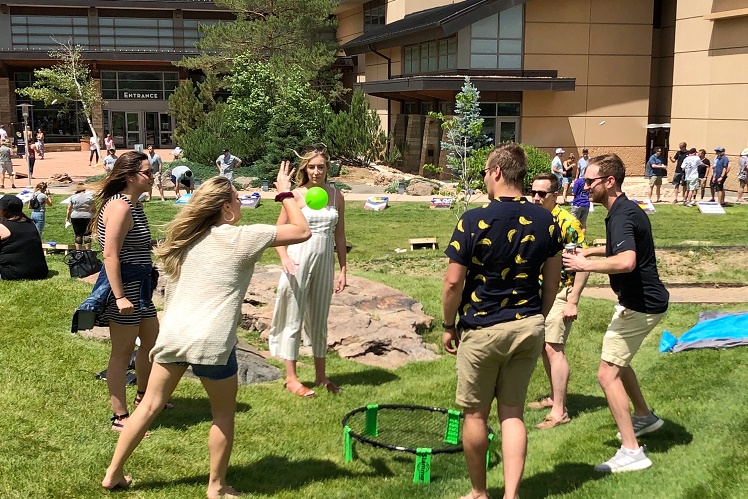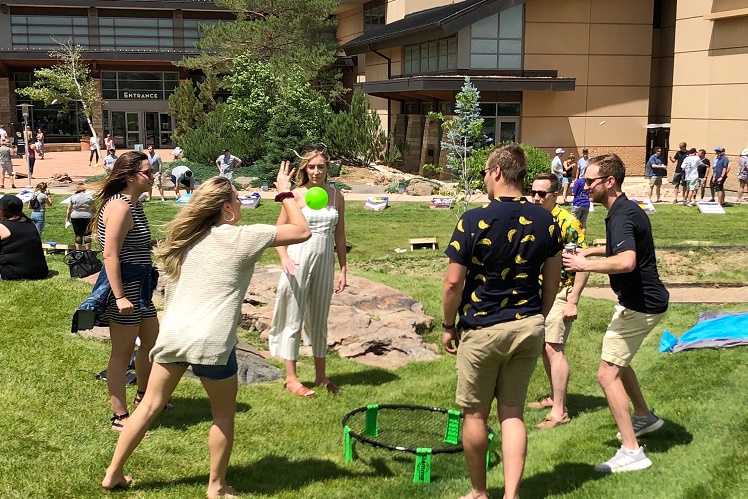Why you should implement unstructured playtime at your office


Why you should implement unstructured playtime at your office

A work team plays a game of spikeball at a company picnic on the CU South Denver campus.
As a child, playtime is a part of our everyday life, however as we get older, it becomes all work and no play. However, as the modern workplace evolves — with tech companies and startups are adding elements of play directly into the office space and many companies adding remote work opportunities for its employees — this is beginning to change.
Going back to the basics, there is a sound body of research that supports the use of “unstructured playtime” in the modern workplace. Particularly in Colorado, where people are moving in masses to get closer to the outdoors, employees value a company that encourages their enjoyment of the state’s outdoor opportunities.
By getting your employees out of the office and into a space where they can connect and bond with their colleagues (all while having fun), you are creating a company culture that attracts and retains the best workers, stimulates productivity and creates work-life balance that is essential to Colorado employees.
What constitutes unstructured playtime?
While there are a number of available team building activities, unstructured playtime involves no agenda, limited distractions (mainly from devices), limited planning and no conversations centered around work.
Colorado has endless opportunities for this type of “playtime.” This can include nature walks in spaces near the office, hikes, ski days, a picnic with lawn games in a park or anything that gets your workforce out of the office and into a casual environment where employees can create organic connections while enjoying the state’s greatest asset — it’s beauty.
Benefits of unstructured playtime
Taking a break from work with these unstructured activities can have a number of benefits to your company culture as well as the following.
Productivity
While seemingly counterintuitive, leaving the office can actually increase your employees productivity. By allowing your employees to take a step back, they will re-enter the workplace with a refreshed mindset. Specifically, unstructured playtime, is said to promote a healthy brain function by improving problem-solving, memory and enhancing creativity and innovation. On the other hand, failure to take breaks can lead to employee burnout and increased stress levels.
Retention
The labor market in Colorado is extremely competitive, so having a workplace that gives its employees unstructured time to bond with its colleagues — and outside, nonetheless — makes it that much more attractive to prospective employees.
Plus, in general, the modern workforce is placing an increased importance on work-life balance and having these opportunities for your employees will help you provide that, and in return, they’ll stick around. In this way, building this unstructured playtime into your company culture will save you money by decreasing your turnover.
Connectivity
We spend a lot of our life at work and having employees that enjoy working together is an added benefit — not only will it increase productivity and employee retention, but it will encourage collaboration. Plus, because this time is unstructured, the connections will happen more organically and be stronger because of it.
Stress Management
In addition, when team members are connected and engaged with one another, this will create a respect between employees and help them get through tight deadlines and other stressful situations more easily. Play naturally reduces stress and tensions with the release of endorphins, so having it as part of your office culture will help employees find their zen.
(This sponsored content was provided by CU South Denver.)
 Tina Schlichte is the director of sales and business operations at CU South Denver. She brings more than fifteen years of operations and sales experience to the role. Schlichte’s prior experience includes positions from high-end boutique hotels such as the Little Nell Hotel in Aspen and large city properties such as The Fairmont Chicago, Millennium Park, in addition to her integral role in the successful opening of the Hyatt Regency Aurora-Denver Conference Center.
Tina Schlichte is the director of sales and business operations at CU South Denver. She brings more than fifteen years of operations and sales experience to the role. Schlichte’s prior experience includes positions from high-end boutique hotels such as the Little Nell Hotel in Aspen and large city properties such as The Fairmont Chicago, Millennium Park, in addition to her integral role in the successful opening of the Hyatt Regency Aurora-Denver Conference Center.













